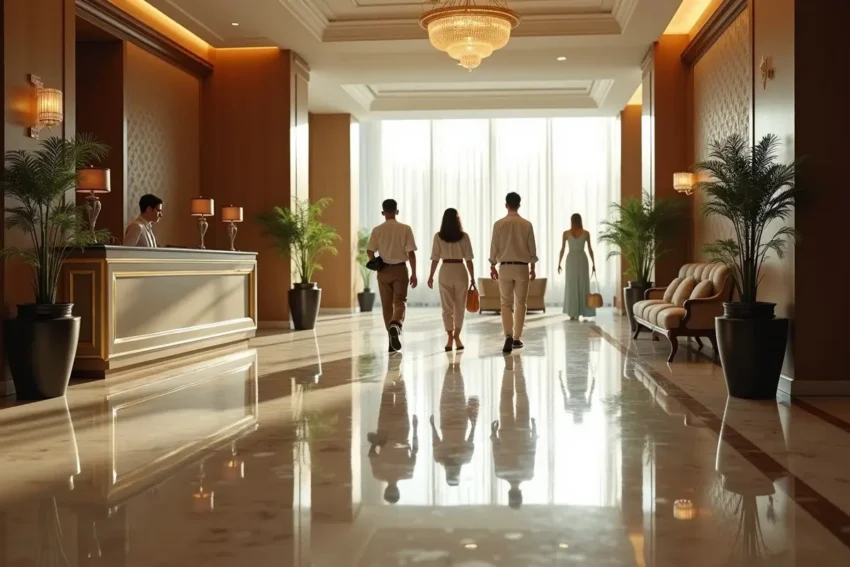Vacations are meant to be relaxing, not risky. But the wrong flooring in a resort can quickly turn a peaceful stay into an accident. To learn more about how flooring affects safety, it’s essential to examine the materials used in these environments closely.
Tile Flooring: Slippery When Wet
Ceramic and porcelain tiles are popular in resorts. They’re durable, stylish, and easy to clean. But when they get wet, they become incredibly slippery.
Poolside areas, lobbies, and bathrooms often use tiles for visual appeal. Unfortunately, these are also high-moisture zones, where slips are more likely to happen. Without proper anti-slip coatings or textured surfaces, tile floors become a serious hazard.
Tile flooring can also crack, creating sharp edges or uneven surfaces. These imperfections may go unnoticed by staff, increasing the chances of tripping. While tile is a common choice, it can be one of the most hazardous if not properly maintained.
Polished Concrete: Sleek But Risky
Polished concrete has become a popular choice in upscale resorts. It’s sleek, modern, and low-maintenance. However, that shiny surface comes at a cost—especially in terms of guest safety.
Like tile, polished concrete becomes slippery when wet. Rain, spilled drinks, or pool water can turn this smooth surface into a danger zone. It doesn’t help that polished concrete often lacks visible traction.
This material is also very hard, which increases the severity of injuries when falls do occur. There’s little cushioning, and landing on this type of surface can lead to fractures or head injuries. While attractive and polished concrete is far from ideal for guest areas.
Natural Stone: Beauty With Hidden Dangers
Marble, granite, and other natural stones are used in high-end resorts for their luxurious feel. They add elegance to lobbies, hallways, and restrooms. But looks can be deceiving—stone flooring presents unique safety challenges.
First, natural stone is often very smooth, especially when polished. This makes it extremely slippery when wet or dusty. Second, stones can be uneven if not installed properly, creating trip hazards.
Finally, the weather plays a role. In tropical or humid climates, condensation on stone floors is a common occurrence. Guests wearing sandals or wet footwear are particularly at risk on these surfaces.
Hardwood And Laminate: Attractive But Unstable
Wood flooring creates a warm, inviting look. Resorts use hardwood or laminate in guest rooms, lounges, and spa areas. However, these materials also pose risks.
Hardwood can become slick with even a small amount of moisture. Spills, steam, or high humidity levels can make surfaces unsafe. Laminate, especially lower-quality types, may warp over time—creating uneven spots that can catch a foot.
Additionally, wood surfaces can get scratched or worn, reducing grip. Without routine maintenance, they quickly turn from stylish to slippery. Resorts must be vigilant in keeping these floors safe.
Carpet: Safer, But Not Foolproof
Carpet is generally safer because it provides traction and cushioning. It’s commonly used in hallways, guest rooms, and conference spaces. But that doesn’t mean it’s perfect.
Loose carpet edges, wrinkles, or torn sections can cause trips and falls. In addition, a wet carpet can become slippery and harbor mold or bacteria. In areas with heavy foot traffic, carpets tend to wear down and lose their grip over time.
Though safer than hard surfaces, carpet still requires regular checks and maintenance. Otherwise, the features that make it safe can quickly become liabilities.
What Resorts Can Do To Reduce Risk
Resorts have a responsibility to ensure the safety of their guests. Choosing flooring with slip-resistant surfaces is the first step. Adding rugs, mats, and grip strips in key areas helps too.
Routine inspections are essential. Staff should check for loose tiles, worn carpets, and moisture buildup. When problems are spotted early, injuries can often be avoided.
Proper signage is another simple but effective safety tool. Warning signs near wet floors or recently cleaned areas can prevent accidents before they happen.
Conclusion
Flooring choices in resorts affect more than just style—they directly impact guest safety. Slippery or poorly maintained materials increase the chance of falls. To learn more about protecting yourself or others, awareness is the first step.

